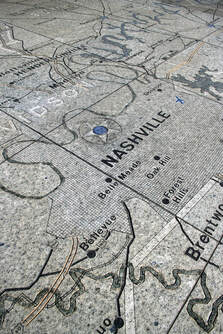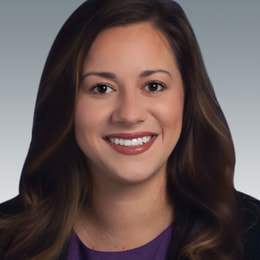 An interview with Rachel Lemons, Project Manager, ONE Tennessee by Anna Morgan, RN, BSN, MPH, NaRCAD Program Manager Tags: Opioid Safety, Project Management NaRCAD: Thank you for taking the time to speak with us today—we’re excited to hear about you and your team! Can you tell us a bit about ONE Tennessee and how your organization first became involved with academic detailing? Rachel: ONE Tennessee is a state-wide nonprofit healthcare collaborative who is focused on fighting the opioid epidemic. We were founded as an outcome of a summit hosted by the Tennessee Department of Health called “Turning the Tide.” The summit joined together healthcare professionals and stakeholders to discuss best practices for tackling the epidemic. Academic detailing was highlighted as a best practice during the summit and it was collectively decided that it would become one of our initial projects. ONE Tennessee brought the academic detailing pilot program to life through the opioid crisis funding the Department of Health received from the Centers for Disease Control and Prevention. NaRCAD: We’re glad to know that the strategy of AD was highlighted! You’re now managing a program of detailers focused on opioid safety across the state of Tennessee—tell us what that’s like. Rachel: Exciting! Once our detailers were trained by your team, my role was very much supportive in nature. I helped our detailers to identify clinicians in their communities, and troubleshoot any issues. We were fortunate enough to be able to recruit a passionate group of pharmacists for our pilot, and that made my job easier from a clinical standpoint, since they’re the subject matter experts on opioid prescribing. They‘re on the front line of the epidemic, and they fit the perfect mold for engaging with clinicians to build a strong and trusting relationship. NaRCAD: You recently completed the pilot stage of your program. What would you say are some of the biggest lessons you’ve learned so far about building an academic detailing program? Rachel: Getting in the door was one of the biggest barriers our detailers faced. From a programmatic standpoint, I think ONE Tennessee could have done a little more foundational work for our detailers, like speaking with our stakeholders and educating them on academic detailing as it relates to the opioid initiative—that would have really helped our detailers gain access to clinicians. We also learned that time was a barrier for our detailers. Our initial grant period was only one year, and things moved very quickly. We recruited full-time community pharmacists, so having the bandwidth to prepare and complete academic detailing visits was often difficult, especially if there was limited employer support.  NaRCAD: Those are all familiar challenges across many of the programs we support. How did you maintain strong relationships with your detailers and support them in the work that they were doing in the field? Rachel: I always had an open line of communication with our detailers. We had standing monthly webinars, but it was difficult to find a time that worked for everyone because they were full-time pharmacists. Our detailers were scattered across the state and were mostly in rural areas, so I was not able to meet with them in person; however, I was available via email, phone call, and text message. I learned early on that I had to meet detailers where they were. Some detailers did not have time to check email, so it was easier to do a quick call at lunch or early in the morning before their day got started. It really depended on the needs of the detailer, but I always maintained an open line of communication. NaRCAD: That’s a great model, and regular communication helps detailers feel a sense of community through a project. Other supports are often more concrete, like tools and resources. What are some that you've found to be critical to program success, and why? Rachel: I think first and foremost, our partners, specifically NaRCAD, the Tennessee Pharmacists Association, the Tennessee Hospital Association, the Tennessee Nurses Association, the Tennessee Medical Association, and the Tennessee Department of Health, were a tremendous resource that made our program incredibly successful. Google’s platform (Google Drive, Google Sheets, and Google Docs) was also critical to our success, as it allowed us to share data and updates in real time. We did not have access to specific evaluation tools because we are a young organization and our grant period was only one year. Our shared space online helped me to stay organized and capture information from our detailers all in one place, and it was free!  NaRCAD: These are all great reflections for AD program managers to learn from. Based on the successes and challenges of this pilot, where do you see your program in a year? Rachel: I see us continuing our current model with our inaugural group of academic detailing community pharmacists while working towards designing, developing, and implementing a “train -the -trainer” model in partnership with your team. I also see us having discussions with large and small hospital systems to customize plans to fit their unique needs related to opioid safety. Most importantly, we want to continue to support the state and our other healthcare stakeholders who are with us on this journey. NaRCAD: We’re happy to help support that vision. Any other important advice/tip that you’d give to other young programs? Rachel: Patience. You must have an understanding that there are going to be pitfalls, but if you have the support and the right people involved, your program is going to succeed. Also, don’t try to reinvent the wheel if you don’t have to. There are so many other programs out there — reach out to people and have conversations! NaRCAD: Rachel, thank you so much for sharing your experiences with us. We're excited to see the impact of your program into the future.  Biography. Rachel Lemons found passion for public service early on in life. She is committed to assisting those with the greatest need in her community. She’s working to effect change socially and through public policy. She is a graduate of East Tennessee State University, where she received her Bachelor of Science in Public Health. Her involvement with Tennessee’s Opioid Epidemic began with the Department of Health, where she was exposed to the State’s rapid response in this fight which lead her to joining ONE Tennessee as a Project Manager. She continues to build her career with a practical and wide ranging set of experiences in order to gain a global perspective on health issues facing communities today. Rachel is an active member in the Junior League of Nashville, Tennessee Public Health Association and currently serves as the Board Intern at Cheekwood Estate & Gardens in Nashville. Comments are closed.
|
Highlighting Best PracticesWe highlight what's working in clinical education through interviews, features, event recaps, and guest blogs, offering clinical educators the chance to share successes and lessons learned from around the country & beyond. Search Archives
|
